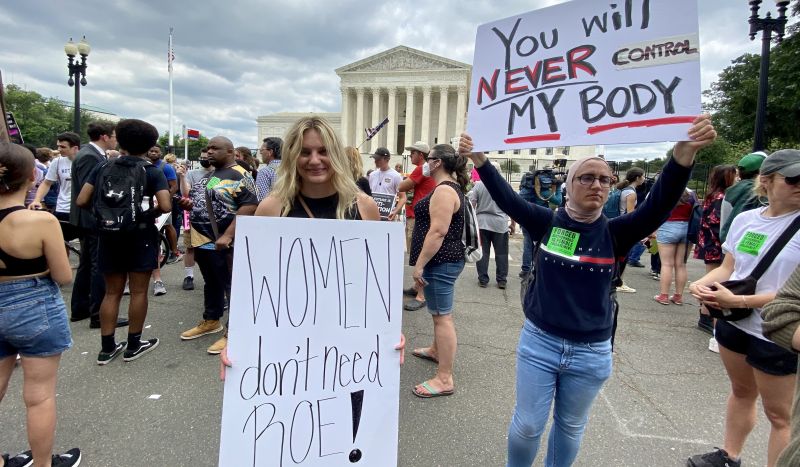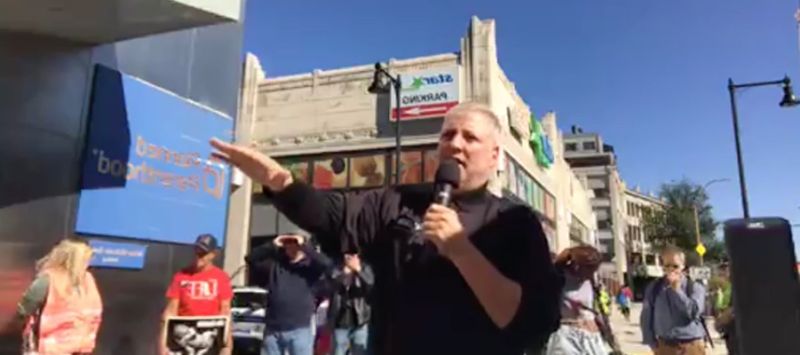 Anna Lulis from Moneta, Virginia, (left) who works for the pro-life group Students for Life of America, stands beside an abortion rights demonstrator outside the U.S. Supreme Court in Washington, D.C., on June 24, 2022, after the court’s decision in the Dobbs abortion case was announced. / Katie Yoder/CNA
Anna Lulis from Moneta, Virginia, (left) who works for the pro-life group Students for Life of America, stands beside an abortion rights demonstrator outside the U.S. Supreme Court in Washington, D.C., on June 24, 2022, after the court’s decision in the Dobbs abortion case was announced. / Katie Yoder/CNA
Denver, Colo., Jan 26, 2023 / 10:12 am (CNA).
With the Biden administration’s expansion of abortion pill distribution to neighborhood pharmacies, pro-life college students and other anti-abortion advocates are organizing campaigns against CVS, Walgreens, and other companies that have announced that they will dispense the drugs.
“Our purpose of having these protests is so that we can let ‘Big Pharma’ companies know that it’s absolutely unacceptable to offer abortion at our neighborhood drug stores,” Caroline Wharton, Students for Life of America press strategist and staff writer, told CNA Jan. 24.
Students for Life is asking pro-life advocates to join its planned protests and advocacy actions directed at companies that have announced their intention to distribute the abortion drug mifepristone. The pro-life organization has almost 1,300 student groups on high school and college campuses, according to its website.
On Valentine’s Day, Feb. 14, Students for Life will hold its kickoff protest “Cancel Abortion Cartels” at Walgreens’ corporate headquarters in Deerfield, Illinois. It has called for a National Day of Protest at local pharmacies on March 4.
The U.S. Food and Drug Administration on Jan. 3 announced it would allow any patient with a prescription to obtain mifepristone from her local retail pharmacy. Both CVS and Walgreens have said they will pursue a certification process to provide the drugs, and Rite Aid has said it will dispense the drugs at a limited number of pharmacies and through the mail.
The protests, Wharton said, aim “to let these CEOs know that they need to go back on this decision. They do not need to certify this program with the FDA and they should not be distributing these life-ending drugs.”
“I don’t want to go into a drugstore and be able to buy my chewing gum and my tights and then get a pill that ends a life. It’s just not acceptable,” Wharton told CNA.
The drug mifepristone works by cutting off nutrients necessary for a fetus to continue developing. It is paired with another drug called misoprostol, which is taken 24 hours or more later to trigger uterine contractions to expel the baby’s dead body. The drug is FDA-approved for abortions up to 10 weeks into gestation. It already accounts for more than half of all abortions in the U.S.
CNA sought comment from Walgreens, which repeated its intentions to distribute abortion pills.
“We intend to become a certified pharmacy under the program,” a spokesperson said Jan. 24. “We are working through the registration, necessary training of our pharmacists, as well as evaluating our pharmacy network in terms of where we normally dispense products that have extra FDA requirements and will dispense these consistent with federal and state laws.”
CVS did not respond to a request for comment.
Students for Life will “absolutely oppose” all pharmacies dispensing the abortion pill, Wharton said. The arrival of the abortion pill at the neighborhood pharmacy “changes the battlelines for the pro-life movement,” Wharton said.
While prayers and sidewalk counseling outside abortion facilities have been a continual practice, plans to distribute the abortion pill through neighborhood pharmacies “changes the way that we’re able to work.”
“Abortion is very harmful for a community overall, so bringing it into all communities like that, I think, is very detrimental,” she said.
Students for Life is organizing letter-writing campaigns and an effort to send Valentine’s Day cards to CEOs to ask them to “urge them to stop making our pharmacies abortion facilities and distributing deadly chemical abortion pills,” its website said.
40 Days for Life, a longtime organizer of peaceful prayer and pro-life outreach campaigns at abortion clinics, will encourage protests at pharmacies during its upcoming Feb. 22-April 2 campaign.
“CVS and Walgreens have replaced Planned Parenthood as the most significant abortion chains in the Western Hemisphere,” Shawn Carney, president and CEO of 40 Days for Life, told CNA Jan. 24. “With 18,000 locations between the two, and now Rite Aid joining in, we have given the hundreds of 40 Days for Life campaign leaders not currently leading a campaign the opportunity to do so outside a pharmacy.”
Last week on its website, 40 Days for Life said the CVS and Walgreens decisions are “turning their stores into abortion facilities.” The organization invited people who don’t have an abortion facility nearby to apply on its website to lead a protest in front of pharmacies that have said they will dispense abortion pills.
Leading these campaigns can “save lives through your witness and abortion pill reversal,” empower pro-life pharmacists, educate the community about the dangers of chemical abortion to women and babies, and “send a message to pharmacy executives that dealing in death is not a good business decision.”
“A dedicated abortion facility is still our first priority, but we have lost campaigns for the best reason — their abortion facility has gone out of business,” Carney told CNA. “Those locations — and many more in rural America — will now be focusing on abortion dispensing pharmacies. The complications of these dangerous abortion drugs (which often result in ER visits or follow-up appointments) and the employee conscience rights issues hitting CVS and Walgreens right now will be a legal headache for pharmacies.”
Until this month, FDA policy only allowed certified doctors, clinics, and some mail-order pharmacies to dispense mifepristone.
Critics of the drug include the Charlotte Lozier Institute, a pro-life think tank. Its July 2022 fact sheet on risks and complications of chemical abortion said that abortion pills are four times riskier than surgical abortions. The need for follow-up care can range from 3% to 10% of women when the drug is taken early in pregnancy and up to 39% of women if accidentally taken late in pregnancy, when surgery could be required.
Women could be put at risk by a lack of ultrasound tests to confirm the age and the position of the unborn child, especially if there is an ectopic pregnancy. A lack of blood test requirements could affect Rh-negative women, who need special treatment to avoid serious risks to future pregnancies.
Wharton said that easier access to the pills can make it easier for abusive men to conceal pregnancy and abuse.
“It’s going to make it easier for abusers in the community to buy these pills,” she objected. “It’s going to make it easier for a woman in a situation where she’s vulnerable to get an abortion, and she has nobody counseling her.”
[…]





